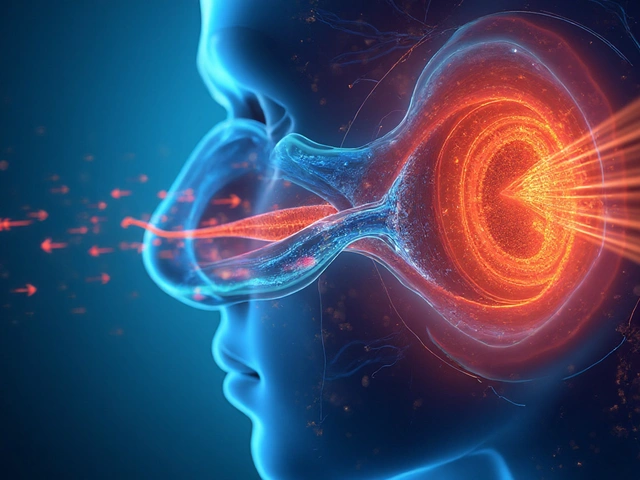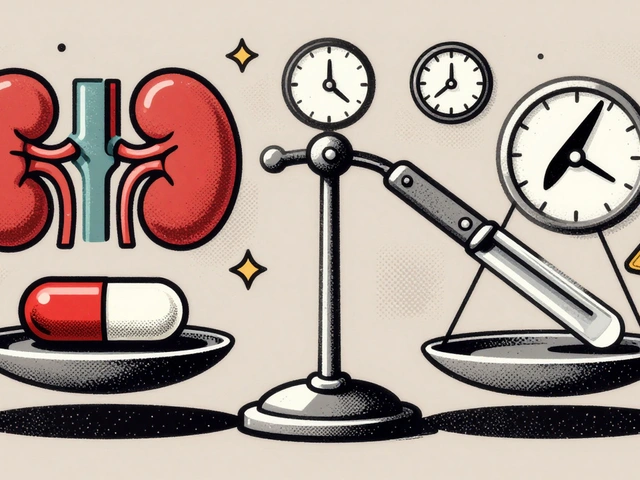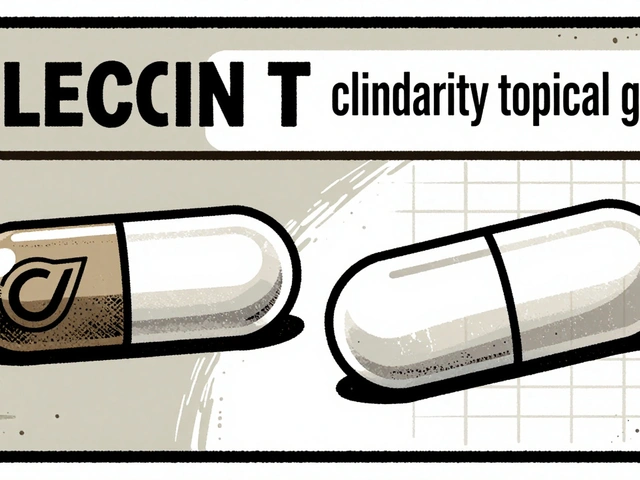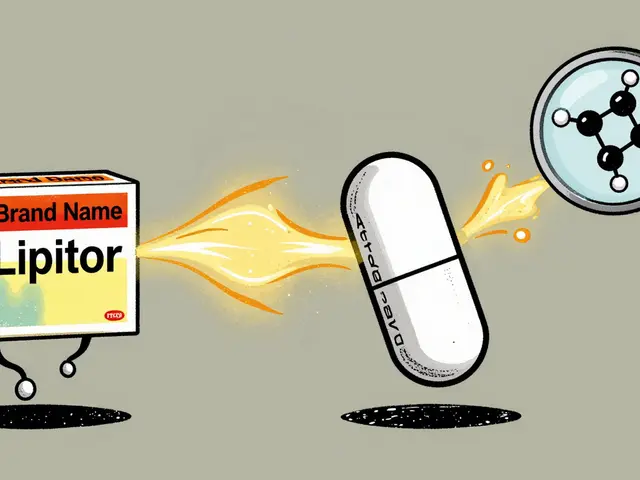Emtricitabine: Managing HIV While Taking Care of Your Mind
Dealing with HIV is no small feat, and when you're on medications like emtricitabine, it becomes a nuanced journey. Emtricitabine is one of those vital players in the fight against HIV. It's often part of comprehensive treatments designed to get the virus under control and reduce the risk of transmission. But while these meds target the virus, there's another aspect that folks often worry about—how does this affect my mental health?
Medications can sometimes have tricky side effects, including ones that might mess with your mental well-being. It's important to address how taking emtricitabine along with other meds might impact your mood and overall mental state. After all, taking care of your mind is just as crucial as managing your physical health.
So, what can you do if you're feeling the mental toll? First, let's acknowledge it's okay to feel overwhelmed. Don't keep it to yourself. Chat with your healthcare professional; they can offer insights and maybe even adjust your treatment if needed. You're not alone in this journey, and there are practical steps to make it manageable.
- Understanding Emtricitabine and Its Role
- Impact of HIV Medications on Mental Health
- Practical Coping Strategies
- Building a Supportive Environment
Understanding Emtricitabine and Its Role
So what exactly is emtricitabine, and why is it such a big deal? Well, it's part of a group of medications called antiretrovirals used to keep HIV in check. Emtricitabine works by blocking the virus's ability to replicate itself, which means it helps prevent HIV from making copies and spreading in the body.
This medication is often bundled with others in combination pills. Think of it as a superhero team-up, where emtricitabine teams up with other meds like tenofovir. This combo approach is super effective in reducing the amount of virus in the blood to undetectable levels, which not only helps your immune system but also reduces the chance of passing HIV to others.
Why It's So Important
Getting down to the nitty-gritty, one of the key reasons emtricitabine is essential is because it contributes to what's called viral suppression. Viral suppression is when the load of HIV in your blood is so low that standard blood tests can't detect it. This is what keeps the virus from progressing to AIDS and helps maintain a better quality of life.
An essential thing about this medication is its role in PrEP (pre-exposure prophylaxis), a preventive strategy for those at high risk of getting HIV. When used consistently, PrEP with emtricitabine and other meds can reduce the risk of infection significantly.
Quick Facts
- Emtricitabine is usually safe and well-tolerated, but like any medication, it can have side effects, although most people don’t experience them.
- Common side effects might include headaches or mild nausea, but they tend to settle down as your body adjusts.
- It's important to stick to your medication schedule—missing doses can affect how well it works.
| Combination | Usage |
|---|---|
| Emtricitabine + Tenofovir | PrEP and HIV Treatment |
| Emtricitabine + Other Antiretrovirals | HIV Treatment |
So there you have it, a straightforward look at emtricitabine and why it's a key player in managing HIV. Whether it's keeping the virus in check or preventing it altogether, understanding this medication helps you make informed decisions about your health.
Impact of HIV Medications on Mental Health
Starting your journey with Emtricitabine and other HIV medications can feel overwhelming, especially when it comes to understanding their effects beyond controlling the virus. HIV meds, while life-saving, sometimes come with side effects that can surprise you, especially on the mental front.
First up, let’s talk about mood swings. Many people report feeling changes in their moods. It might be subtle for some, while others could experience more pronounced depressive symptoms. And it’s not just Emtricitabine; a whole host of medications can chip in to these feelings. It's like your emotions are suddenly on a roller-coaster ride you didn’t buy tickets for!
Then there’s possible anxiety. It's not uncommon for individuals on these meds to report increased anxiety levels. These feelings might arise as you deal with the realities of living with HIV, but they could also be sparked by the treatment itself.
Why Does This Happen?
The brain and body are quite intertwined, and any medication that affects your immune system can also influence brain chemistry. Your body's getting used to the drug, adjusting its inner workings which might cause some temporary disruptions.
| Common Mental Health Challenges | Patients Reporting (%) |
|---|---|
| Anxiety | 30% |
| Mood Swings | 25% |
| Depression | 20% |
These numbers aren't here to scare you, but to remind you that you're not alone. Knowing others face similar battles can sometimes offer solace.
What Can You Do?
Don’t brush things under the rug. Speaking with your healthcare provider is step one; they've probably heard it all and can guide you toward solutions, be it adjusting your meds or finding supportive therapies. And talk to friends or join a support group; a bit of understanding and camaraderie goes a long way.
Remember, adjusting to any medication takes time. Keep track of how you feel and don’t hesitate to reach out if something feels off. Managing mental health isn't just a side note in HIV treatment; it’s a big part of living well.

Practical Coping Strategies
Living with HIV and managing treatments like emtricitabine can be a lot, so finding ways to cope that actually work for you is essential. You might think it's a mind game—and you'd be right!
Stay Active
Getting some exercise in your routine is one of the simplest and often overlooked ways to support your mental health. It doesn't have to be intense; even a short daily walk can boost your mood.
Talk It Out
Whether it's with a therapist or just a good friend, having someone to chat with makes a world of difference. It helps you process what's going on and gives you a chance to vent without holding back.
Mind the Medication Effects
We can't ignore the fact that HIV treatment can have side effects. Keeping track of any changes you feel and discussing them with your doc is key. Adjustments can often be made to help you feel better.
Keep a Routine
Sticking to a daily routine adds structure to your day, making challenges feel a bit more manageable. Try to set regular times for meals, meds, and sleep.
Join Support Groups
Being part of a support group with peers who understand what you're going through can be incredibly comforting. You share stories, advice, and tips on handling both HIV and mental health issues.
- Find local groups through community centers or online forums.
- Engage in activities or regular meet-ups.
- Share experiences and learn from others.
Now, these might seem like small steps, but they can seriously make a difference. Each one is a step towards making your life with HIV a little easier, and that’s worth every effort!
Building a Supportive Environment
When you're living with HIV, a strong support system can make a world of difference in how you cope. It's not just about medications like emtricitabine, but also about feeling understood and cared for by those around you.
Start with Your Inner Circle
Friends and family can offer invaluable emotional support. Share your journey with them if they're comfortable hearing about it. They might not know what to say or do right away, but openness increases understanding. Sometimes just having someone to talk to can lift a weight off your shoulders.
Join Support Groups
HIV support groups are a fantastic way to connect with people who really get it. They’re in similar shoes and can offer practical advice and share experiences. Look for local groups in Birmingham or online communities where you feel safe and right at home.
Communicate with Healthcare Professionals
Don't underestimate the power of regular check-ins with your healthcare team. They’re in the loop about your health and can provide updates about HIV treatment advancements or mental health resources.
Consider Mental Health as Part of Treatment
Mental health professionals can offer more than just an ear; they can provide actionable strategies to handle stress and anxiety. A therapist or counselor specializing in chronic illnesses might provide that extra support you need.
| Aspect | Tip |
|---|---|
| Friends and Family | Share your experiences openly |
| Support Groups | Look for local or online options |
| Healthcare Team | Schedule regular check-ups |
| Mental Health Professionals | Seek specialists in chronic conditions |
By establishing a solid support network and taking advantage of resources tailored to those with HIV, you're not just handling a condition—you're thriving despite it. Everybody's journey is unique, so find what works best for you and stick with it. Remember, it's okay to ask for help when you need it.






15 Comments
Selina M
March 16 2025Take it easy and remember you’re not alone.
Kristin Violette
March 24 2025When navigating the psychosocial terrain of antiretroviral therapy, it’s crucial to integrate neuropsychiatric monitoring into routine care. The pharmacokinetic profile of emtricitabine, while generally benign, can intersect with serotonergic pathways in susceptible individuals. Empirical evidence suggests a modest incidence of mood dysregulation that warrants proactive screening. Leveraging validated scales such as the PHQ‑9 and GAD‑7 can facilitate early detection of depressive or anxious phenotypes. Ultimately, a multidisciplinary approach that synergizes infectious disease expertise with mental health services optimizes both virologic suppression and psychosocial resilience.
Diane Larson
April 2 2025Great points above! Adding to that, it's helpful to keep a medication‑effect diary – jot down any mood shifts, sleep changes, or anxiety spikes you notice after dosing. Sharing that log with your provider can pinpoint whether emtricitabine or another component is the culprit. Also, consider adjunctive CBT or mindfulness apps; many people find them effective alongside their ART regimen. Remember, you’re not just treating a virus, you’re cultivating overall wellness.
Michael Kusold
April 10 2025i’ve seen a lot of folks say the meds mess with their head, but honestly it’s often the stress of the diagnosis. still, stay on top of your routine and let your doc know if you feel off. sometimes a tiny tweak in timing makes a big diff.
Jeremy Lysinger
April 18 2025Mind the meds. Talk to your doc if you notice mood swings.
Support groups help.
Nelson De Pena
April 27 2025Precisely, adherence remains the cornerstone of virologic control. Yet when neuropsychiatric side effects emerge, a dose‑adjustment or substitution may be warranted. Partnership with a psychiatrist familiar with ART can streamline this process.
Wilson Roberto
May 5 2025Philosophically speaking, the mind‑body dialectic becomes starkly apparent when pharmaceutical agents intersect with cognition. Emtricitabine, as a nucleoside reverse transcriptase inhibitor, primarily targets viral replication, yet its systemic distribution inevitably influences cellular energetics. Some patients report subtle affective fluctuations that may be attributed to mitochondrial stress or cytokine modulation. It is essential to distinguish between pharmacologically induced mood alterations and the psychosocial burden of living with HIV. Regular neurocognitive assessments can serve as an early warning system. Moreover, integrating psychotherapeutic modalities-such as acceptance‑based strategies-can fortify resilience. When clinicians adopt a holistic lens, the therapeutic alliance flourishes, promoting both viral suppression and mental equilibrium. Consequently, the stigma surrounding mental health side effects diminishes, fostering open dialogue. In sum, the interplay is complex but manageable with informed vigilance.
Lisa Franceschi
May 12 2025While the preceding analysis offers valuable insights, it is imperative to adhere to evidence‑based guidelines when addressing neuropsychiatric adverse events. The United States Department of Health and Human Services recommends systematic screening at each clinical encounter. Should persistent depressive symptoms be identified, a referral to a mental health professional experienced in HIV care is advised. Additionally, dose modifications should be considered only after thorough risk‑benefit evaluation.
Samantha Vondrum
May 20 2025Incorporating structured psychotherapy alongside ART has been shown to improve adherence rates and overall quality of life. 😊📚
Kelvin Egbuzie
May 28 2025Sure, blame the meds for everything while ignoring the shadowy agendas behind pharmaceutical approvals. It’s all a grand experiment, and the side‑effects are just data points.
Don’t trust any of the “studies” they push.
Stay skeptical.
Joey Yap
June 4 2025I hear the concerns, but it’s also important to recognize that many reported side effects are anecdotal and not universally experienced.
Engaging with a trusted healthcare provider can help differentiate true drug‑related issues from external stressors.
Compassionate listening and evidence‑based guidance often alleviate worries.
Community support can also provide perspective.
Narasimha Murthy
June 12 2025From an analytical standpoint, the discourse surrounding emtricitabine’s psychological impact frequently suffers from confirmation bias. Peer‑reviewed literature points to a low incidence of clinically significant neuropsychiatric events when the drug is used as prescribed. Nonetheless, vigilant monitoring remains prudent.
Sarah Fleming
June 19 2025Behold the silent puppeteers-those hidden hands that dictate our prescriptions while we remain oblivious. They whisper in white coats, yet the side‑effects echo like clandestine warnings. One must question: are we truly conquering the virus, or merely dancing to a drug‑induced illusion?
Katherine Collins
June 26 2025Well, that was a wild ride 😂
Theo Asase
July 3 2025Let us examine the broader geopolitical tapestry that frames our medical choices. The emergence of emtricitabine as a cornerstone of HIV therapy did not occur in a vacuum; it was bred from a confluence of governmental subsidies, patent battles, and corporate lobbying. In nations where sovereign pride pervades, the narrative often glorifies the triumph of science while obscuring the machinations that fuel profit‑driven drug distribution. This amalgamation can breed a false sense of security, tempting individuals to place blind faith in a regimen that may subtly alter their neurochemical equilibrium. While the majority of patients report tolerable side effects, a non‑negligible subset experiences persistent anxiety, mood dysregulation, or depressive episodes-phenomena that can be dismissed as mere psychosomatic responses to living with HIV. Yet we must ask: are these reactions solely attributable to the virus, or do they reflect an under‑explored pharmacodynamic interaction? Moreover, the global supply chain for antiretrovirals is heavily dependent on a handful of manufacturing hubs, rendering many countries vulnerable to geopolitical leverage. When a nation asserts its autonomy, it may reject imported generics, thereby limiting access to affordable treatment and inadvertently amplifying mental health stressors among its populace. A further concern lies in the covert integration of surveillance mechanisms within health systems, wherein medication adherence data is collated to monitor populations deemed “high risk.” Such practices erode trust between patients and providers, potentially exacerbating mental health burdens. It is incumbent upon clinicians to remain vigilant, to interrogate not just the virologic metrics but also the psychosocial dimensions of therapy. Comprehensive care should involve regular mental health assessments, transparent discussions about potential side effects, and culturally sensitive support structures that empower patients rather than subjugate them. In doing so, we honor both the scientific rigor and the human dignity that warrant the ultimate goal: a life free from both viral oppression and the shadows of anxiety or depression. Only then can we claim a true victory over HIV that respects both body and mind.